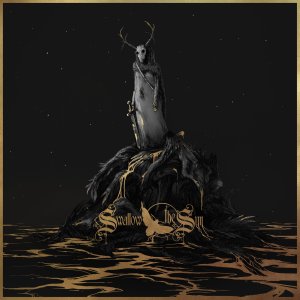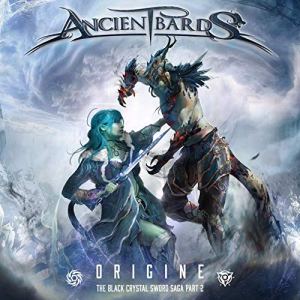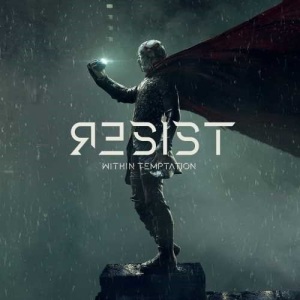
It’s been an incredible year for new music, one of the best that I can remember, and I’m wrapping it up with part one of the double Best of 2019 feature. I’ve done a best songs list since 2012, and I think in the end of the year flurry around albums, its excellent songs that often tend to get lost in the shuffle. As expected, there will be some crossover here with the upcoming albums list, but I love giving isolated gems from problematic albums some attention on here. For the metrics, I did consider my iTunes play counts (yes I’m still using an iPod Nano), but as Spotify has increasingly taken over as a source for music, those stats are becoming less relevant. So I had to really check myself to be as honest as possible, even if it makes a few readers shake their heads in bewilderment as I’m sure some of the stuff below will. Be sure to check out our upcoming MSRcast episodes for discussion on late 2019 releases, as well as our gigantic year end blowout episodes where we’ll likely be talking about a ton of stuff not covered here.
1. Avantasia – “Ghost In The Moon” (from the album Moonglow)
The opening track from Avantasia’s flawed but fun Moonglow, “Ghost In The Moon” contained a shimmering, shooting star chorus that was launched on the back of a gorgeous, rolling piano melody. It was a strange track coming from Sammet, with a rounded, soft approach to the songwriting that owed more to classic rock n’ roll than the sharp edges and angles of metal. It was the first time he simultaneously wore the Jim Steinman influence on his sleeve and yet transcended it at the same time. At just under ten minutes in length, it was an ambitious album opener too —- and I’ve heard so many bands try the epic as the opener gambit that have fallen flat on their faces and irreparably damaged an album’s pacing and momentum. Sammet must’ve felt confident that he had a gem on his hands then, and in another sign of confidence, took on this song solo on an album full of guest vocalists on all the other songs. The fantastic gospel choir backing vocalists singing half a beat behind him provided that soaring, spiritual uplift that lodged this song in comfort listening territory all through the year.
2. Sabaton – “Seven Pillars Of Wisdom” (from the album The Great War)
Built on insistent riff progressions and an inspired vocal melody from Joakim Broden, Sabaton found magic on the stirringly heroic “Seven Pillars Of Wisdom”, a song about the exploits of the legendary T.E. Lawrence. There’s a riding on horseback through the desert rhythmic gallop at work here, and a swashbuckling swing to the chorus, suggestive of the derring-do ascribed to Lawrence himself in the lyrics. Largely devoid of keyboards, it was also refreshingly aggressive for Sabaton, built on the mechanized rhythm guitar of Chris Rörland and wild, flashy fireworks of Tommy Johansson. It was the clear highlight off The Great War, and should go down as an all-time classic for the band, and to my ears its their best song to date.
(Also appears on: The Metal Pigeon’s Best Albums of 2019)
3. Idle Hands – “Dragon, Why Do You Cry?” (from the album Mana)
Truth be told, there were a few songs off Idle Hands incredible debut album that could’ve wound up on this list, in fact I had “Give Me To The Night” and “Jackie” shortlisted for it, but I think it was going to be inconceivable to not include the strange, slightly mystical “Dragon, Why Do You Cry?”. Built on a Queensryche-ian bassline and guitarist Sebastian Silva’s chiming chord strums, this is a moody ballad that’s too dark and metaphorical to call a power ballad. Singer Gabriel Franco narrates us through his weird fantastical dream world with his emotional yet plaintive sounding vocals, sounding detached and possessed of a raw urgency at once. In the song’s apex, Franco counts down from eight to usher in Silva’s incredible, Latin-rock tinged solo, a transcendent moment that is as thrilling as it is weird.
(Also appears on: The Metal Pigeon’s Best Albums of 2019)
4. Ancient Bards – “Light” (from the album Origine – The Black Crystal Sword Saga Part 2)
Ancient Bards are no strangers to ballads, but when they released “Light” just ahead of their fourth album Origine, they raised a few eyebrows. It was a lush piano and vocals centric affair that was dewy-eyed and heart on sleeve, something that wouldn’t have sounded out of place on the Frozen 2 soundtrack. Its glossy, 4kHD music video juxtaposed interpretive dance intercut with singer Sara Squadrani dressed to the nines while singing on the shore of the Adriatic Sea at sunrise. This somehow landed on a conceptual fantasy story driven album? How did that even make sense? It didn’t, but Ancient Bards did it anyway because they had the wisdom to realize that a great song shouldn’t be ignored or stuffed into the vault just because its screamingly different or gasp, even non-metal to its very essence. There are guitars towards the end, including a sugary sweet solo, but by then you’re already miming along to Squadrani doing your best Celine Dion impression. Get. Into. It.
5. Swallow The Sun – “Here On The Black Earth” (from the album When A Shadow Is Forced Into The Light)
The gut wrenching, agonizingly sad emotional center of one of the bleakest albums of this decade, nevermind the year, “Here On The Black Earth” is not an easy listen. It is however, a rewarding one musically speaking, its gripping musical refrain and lyrical motif colliding in a chorus that sends shivers down your arm. The lyrics here are elegiac, woven with imagery of the natural world and flesh and bone. Of course if you’re aware of the backstory behind this record, you’ll know that Juha Raivio was writing from a deeply personal perspective, yet he was also self-aware enough to keep things ultimately vague, providing space for this song to attach itself to anyone’s grief or sadness. The vocal performance by Mikko Kotamäki is fierce and empathetic, he really sinks into the brutal nature of the lyrics on his harsh vocal explosions, while allowing his clean vocals to sound slightly detached and deadened. That’s a tough ask of any singer but you get the feeling that he just knew what to do, and up and did it.
(Also appears on: The Metal Pigeon’s Best Albums of 2019)
6. Frozen Crown – “In The Dark” (from the album Crowned In Frost)
Embodying the very essence of what we love the most about power metal, Italy’s Frozen Crown delivered a gem with “In The Dark”. It’s a tightly written gem burning with an empowering and defiant spirit, with a perfectly sculpted, fully arcing chorus. Vocalist Giada Etro is a dynamic singer, maintaining crispness and intensity through nuanced verses, with effortless transitions to a soaring belt during the refrain. Alongside songwriter/guitarist/co-vocalist Federico Mondelli, the pair are integral to what has become the most exciting new power metal debut on the European mainland in recent years. There’s a youthful vigor to the sound here that is exciting to behold, the kind of thing we heard on Edguy and Sonata Arctica records back in the late 90s. And alongside their compatriots in Temperance and Ancient Bards, they’re redefining what Italian power metal can sound like, and that’s something I’d never have imagined possible a few years ago.
(Also appears on: The Metal Pigeon’s Best Albums of 2019)
7. Avatarium – “The Fire I Long For” (from the album The Fire I Long For)
Sneakily released in late November (Nuclear Blast should know better), this one almost eluded me, but thankfully I caught it in time to consider just how much Avatarium have transitioned away from their 70’s occult rock/doom hybrid into a band that embraces a wider artistic palette. Whether the stepping away of Candlemass founder Leif Edling has been the impetus of change or it was merely a natural artistic progression, there’s a wider range of influences at work throughout their new album. Here on the gorgeous, smoldering title track, vocalist Jennie-Ann Smith channels darker, alt-country chanteuses such as Lucinda Williams, Neko Case, and fellow Swede Nina Persson. This is a hypnotic song, lush and full of depth and artistry, both in Smith’s expressive vocals but also in guitarist Marcus Jidell’s inspired, loose, dark-countrified licks. Don’t skip this tune.
8. Dialith – “The Sound Of Your Voice” (from the album Extinction Six)
The lead off track from one of the year’s most visceral and exciting releases, “The Sound Of Your Voice” is the likely introduction for many to Connecticut(!) symphonic metallers Dialith, having been a full-length YouTube ad that a lot of folks may have stumbled upon whilst watching other videos. It’s a remarkable song on its own, not least for its perfect encapsulation of Dialith’s many interlocking musical elements, but for its euphoric, triumphant spirit streaking through it, particularly in the latter half of the song. Through a combination of crunchy and dense melodeath riffing, restrained keyboard symphonics, and the serene yet strong vocals of
Krista Sion, Dialith have single-handedly brought a fresh perspective to what symphonic metal could and should sound like. And just to put into perspective how utterly spectacular Extinction Six is as an album, I also had “Break The Chains” and “In Every Breath” as nominees for this list as well. As you might predict, this isn’t the last time I’ll be writing about Dialith this year…
(Also appears on: The Metal Pigeon’s Best Albums of 2019)
9. Everfrost – “Winterider” (from the album Winterider)
Everfrost was one of those unexpected, out of nowhere surprises this year, and they arrived like a good priest with the timely heals in your mmorpg party (in the game of your choice of course —- shout out to any old Shadowbane players!), swooping in to comfort us in the wake of Sonata Arctica’s disastrous new album with a blast of sugary, wintry old school Finnish power metal. It’s hard to imagine a more timely release. But founding member/keyboardist Benjamin Connelly gets credit for being more than just the sum of his influences, being a sharp songwriter capable of crafting razor sharp hooks in songs imbued with a sense of freshness and fun. Case in point is the title track “Winterider”, which features one of the most satisfying opening keyboard/guitar riffs in power metal history, and packs as much energy as possible in its tight, compact synth melodies and urgent guitars. The band’s anime/manga aesthetic clearly leaves more than just a visual imprint on the band, with the frenetic, insistent pacing of this song reminding me of equal parts Galneryus and J Rock as it does the ultra-fast cutting and editing of the most hyperbolic animes. The glorious finale from the 3:26 moment onwards is what got this track on this list, bringing an adrenaline rush so addictive that I needed a daily fix.
10. Gloryhammer – “Gloryhammer” (from the album Legends From Beyond The Galactic Terrorvortex )
It would be downright disingenuous to leave this track off the best songs list, considering how much I listened to it throughout the year, surprising not only myself but those around me who’d heard me grumble about bands like Gloryhammer in the past. Well opinions can change over time and shout out to the crew in the r/PowerMetal community for yet another thing they’ve managed to foist upon my playlists, because it was their enthusiasm for Gloryhammer that caused me to consider their new album this year with fresh ears and an open mind. It was the eponymous single “Gloryhammer” that was the clear cut apex of an already excellent album, with a hook built on a classic power metal mid-tempo strut and a high arcing vocal melody. The secret to pulling off such ridiculous lyrics lies in vocalist Thomas Winkler’s commanding performance —- his voice is rich with character, affecting the heroic pomp of the character he’s playing without resorting to pure theatrics. Hear the way he shout-sings “…since 1992!”, a minor detail but something that makes me crack a smile every time I hear it. Credit to bandleader/songwriter Christopher Bowes, who quite simply HAD to deliver the band’s most catchy, anthemic, and yes powerful song if he insisted on it being about the band’s namesake weapon. By gods he did it.






